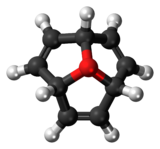Oxatriquinacene
Appearance

| |

| |
| Names | |
|---|---|
| Preferred IUPAC name
(2as,4as,6as)-4a,6a-Dihydro-2a1λ4-oxacyclopenta[cd]pentalen-2a1(2aH)-ylium | |
| Identifiers | |
3D model (JSmol)
|
|
| ChemSpider | |
PubChem CID
|
|
CompTox Dashboard (EPA)
|
|
| |
| |
| Properties | |
| C9H9O | |
| Molar mass | 133.167 |
Except where otherwise noted, data are given for materials in their standard state (at 25 °C [77 °F], 100 kPa).
| |
Oxatriquinacene is an organic cation with formula C
9H
9O+
. It is an oxonium ion, with a tricoordinated oxygen atom with +1 charge connected to carbons 1,4, and 7 of a cyclononatriene ring, forming three fused pentagonal cycles. The compound may possess weak tris-homoaromatic character.
Oxatriquinacene has remarkable stability compared to other oxonium cations, although not as extreme as that of the similar oxatriquinane. It reacts with water, but can be dissolved in acetonitrile. It is of interest as a possible precursor to oxaacepentalene, a hypothetical neutral aromatic species.[1]
Oxatriquinacene was obtained in 2008 by Mascal and coworkers, through a variant of the synthesis that led them to oxatriquinane.[1][2][3]
See also
[edit]References
[edit]- ^ a b Mark Mascal; Nema Hafezi; Nabin K. Meher & James C. Fettinger (2008). "Oxatriquinane and Oxatriquinacene: Extraordinary Oxonium Ions". Journal of the American Chemical Society. 130 (41): 13532–13533. doi:10.1021/ja805686u. PMID 18798616.
- ^ Rachel Petkewich (September 29, 2008). "Taming Alkyl Oxonium Ions: Fused tricyclic structure stabilizes famously reactive alkylating agents". Chemical and Engineering News. 86 (39): 10. doi:10.1021/cen-v086n039.p010.
- ^ Tim Reid (3 October 2008). "Oxonium ions: Ring of stability". Nature Chemistry. doi:10.1038/nchem.70.
